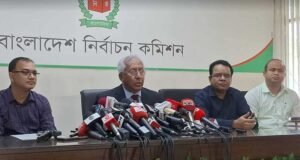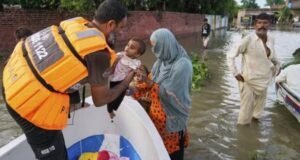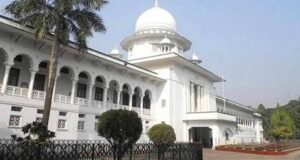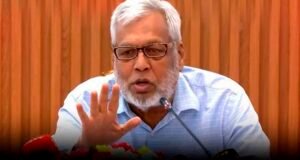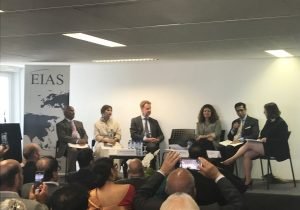
Ansar Ahmed Ullah:
Brussels: Bangladesh and the EU seek to expand their cooperation beyond trade into areas such as climate change, security, connectivity, migration, and the blue economy. The EU and Bangladesh have agreed to initiate negotiations for a Partnership and Cooperation Agreement (PCA) this year to strengthen their partnership said Ambassador Mahbub Hassan Saleh, Ambassador of the Embassy of the People’s Republic of Bangladesh to Belgium.
The Ambassador was speaking at a conference titled “EU-Bangladesh Cooperation: Opportunities and the Bengal Tiger Economy” at EIAS in Brussels, Belgium held on 5 July, organised jointly by Study Circle London and the European Institute for Asian Studies (EIAS). The conference delved into the fifty years of diplomatic relations between the EU and Bangladesh, explored the implications of Bangladesh’s remarkable development and assessed the opportunities for enhanced future collaboration between both partners. The conference was chaired by Lin Goethals, EIAS Director and brought together several highly distinguished speakers from different institutions and organisations from Bangladesh and Europe.
In his Opening Remarks, H.E Ambassador Mahbub Hassan Saleh, Ambassador of the Embassy of the People’s Republic of Bangladesh to Belgium, Luxembourg and Mission to the European Union, emphasised the robust trade partnership between the EU and Bangladesh, with the EU being the destination for 50% of Bangladeshi global exports. Bangladesh’s emergence as a Bengal Tiger Economy since its independence has played a significant role in forming this relationship.
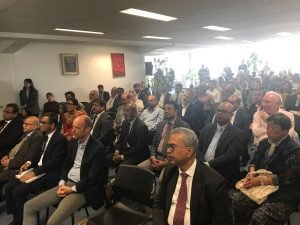
In his keynote speech, Mr Faruque Hassan, President of the Bangladesh Garment Manufacturers and Exporters Association (BGMEA), elaborated on the economic and industrial aspects of the EU-Bangladesh relationship. He emphasised that millions of people in Bangladesh depend on the garment industry, which employs around four million workers, with 60% being female. The industry has played a significant role in the country’s economic growth, as Bangladesh experienced its highest GDP growth of 8.1% from July 2018 to June 2019, and the poverty rate decreased to 18.7%. He also highlighted the significance of EU-Bangladesh bilateral trade. The clothing and textile industry benefits both markets, and Bangladesh aims to diversify into high-end garments, including sportswear and lingerie, while exploring opportunities in non-cotton markets. Deepening the partnership with the EU and retaining market access are crucial, and Bangladesh hopes to receive an extension of its favourable trade conditions. Mr Faruque Hassan also stressed the shift from an agro-based to an industry-based development model in Bangladesh, with two million people joining the labour force annually and projections suggesting that Bangladesh will become the 23rd largest economy by 2050.
Study Circle London Chairman Syed Mozammel Ali presented their recent study: “Bangladesh: The Journey of Indomitable Development”. Referring to the transformation that has taken place in Bangladesh as nothing short of a miracle, considering the country was once described as a “bottomless basket”, Bangladesh is currently the 37th largest economy globally, with a total GDP of 480 billion USD in 2022. Its economy relies heavily on agriculture, with a significant portion dedicated to rice, fish, and vegetable production. Despite being a small country, it accommodates a massive population of approximately 170 million people.
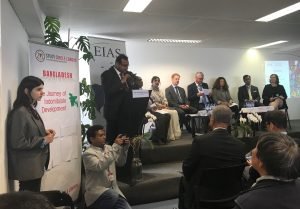
The panel discussion further addressed a number of key issues for development in Bangladesh and its relations with the EU. For instance, Member of the European Parliament, Mr Milan Zver stressed the need for human capacity development in Bangladesh and inclusive governance, specifically focusing on education, skills development, green inclusive development and energy efficiency. Rensje Teerink, Head of Division for South Asia of the European External Action Service, stated how at their 50th anniversary, the relations between Bangladesh and the EU have become more mature and geostrategic. The launch of the PCA negotiations will therefore be key to acquiring a new set of instruments to advance their bilateral cooperation. Bangladesh needs a rebranding and to be recognised for its development efforts.
Former State Minister of Post and Telecommunications Advocate Tarana Halim highlighted the need to turn the people of Bangladesh into a highly skilled workforce and to provide them with jobs. Digital Bangladesh has become a reality and while it is experiencing a steep economic growth, political stability is needed. Bangladesh’s Vision 2021 and Vision 2041, the Delta Action Plan and poverty alleviation, and the development of economic zones are all key government initiatives to steam Bangladesh ready for the future and develop sustainably.
John Cornet d’Elzius, Director for Asia and the Pacific at the Ministry of Foreign Affairs of Belgium stressed the importance of Bangladesh for Belgium as it is the 4th largest exporter to the country in the EU, having seen a steep increase in recent years. Belgium was one of the first countries to recognise Bangladesh after its independence. It remains a key partner in the EU’s Indo-Pacific Strategy and a key element in its strategy to move away from previous dependencies and diversify its partnerships. With key assets like its very young and talented population, its remittances, investments and sustained GDP growth, Bangladesh is important for Belgium for imports and as a market for its products.
Nahim Razzaq, Member of the Bangladesh Parliament, addressed the transition EU-Bangladesh relations have been going through, especially given the EU’s focus on democracy, food, nutrition, sustainable development, education, and human development, now also having moved on to the green sector. He identified three major areas for increased engagement between the EU and Bangladesh: trade and commerce, geopolitics and global cooperation, including in the Indo-Pacific and through the Global Gateway in technology and innovation, as well as security in the broad sense of its meaning, food security, climate change and defence. In addition,
The Q&A session extensively discussed topics related to Bangladesh’s governance, labour issues, trade policy, climate change, skilled labour development, the implementation of laws and regulations, and the upcoming Partnership and Cooperation Agreement. The compliance with labour laws and ILO standards was thereby addressed, with the EU engaging with Bangladesh on labour reforms and a National Plan of Action being set in motion.
Additionally, the importance of the ease of doing business and the business climate dialogue were mentioned, as well as efforts to improve the business environment and foster European investment. Also, climate change and energy goals were emphasised, highlighting Bangladesh’s commitment to renewable energy and land utilisation despite its high population density. The importance of implementation and transparency in governance was stressed, with an invitation for EU observers to assess the electoral processes in Bangladesh. Celebrating the fiftieth anniversary of EU-Bangladesh relations, key takeaways from the conference include the importance of Bangladesh’s LDC graduation and the upcoming PCA negotiations with the EU, the need for a “rebranding” of Bangladesh as a middle-income country, and opportunities for further collaboration on issues such as labour rights, economic diversification, renewable energy development, and migration policies.
 Weekly Bangla Mirror | Bangla Mirror, Bangladeshi news in UK, bangla mirror news
Weekly Bangla Mirror | Bangla Mirror, Bangladeshi news in UK, bangla mirror news


